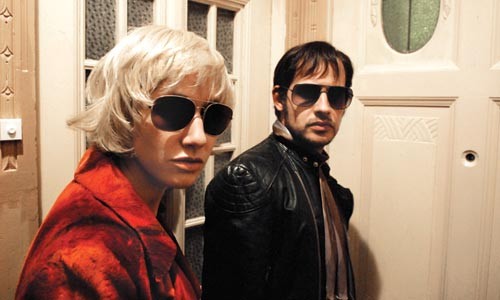If history has taught us one thing, it's that anarchy takes planning. You can't conduct a revolution over a glass of wine and a pack of Camels.
In the 1960s, a radical leftist group formed in Germany and became known as the Baader Meinhof Group, after its two most disparate members. Andreas Baader (Moritz Bleibtreu) was a shaggy-haired young revolutionary committed to any means necessary. Ulrike Meinhof (Martina Gedeck) was a liberal columnist for her husband's newspaper who calls out the Shah of Iran for taking a luxurious seaside vacation while his people sweat back home under the oppressive Persian sun. (She reads her manifesto to her friends at a lawn party.)
The two meet when Andreas and his lover, Gudrun Ensslin (Johanna Wokalek), get arrested for firebombing a department store (a symbol of capitalist excess), and Ulrike interviews Gudrun in prison. When the criminals skip town for Rome, and then sneak back into Germany, they begin to recruit new allies. "We're forming a group," Andreas tells Ulrike. "How can you do that?" she asks. He replies: "What a bourgeois question. We'll do it or die trying." And so their eponymous posse -- formal name: Red Army Faction -- comes together.
Ulrike once made a film about abuse at a girls' school, and it changed nothing, so she's ready, if somewhat reluctantly, to try something new. Andreas' dilemma is simpler: So many targets, so little firepower. As history unfolds around him -- Vietnam particularly enrages the radicals -- he's impatient to change its direction.
The director of The Baader Meinhof Complex, Uli Edel, made a brooding, graphic and deeply moving adaptation of Last Exit to Brooklyn 20 years ago. A political canvas doesn't quite lend itself to those elements -- at least, not in the same way, and not with the same effect, and especially not in these post-radical times.
So he settles instead for a relatively straightforward restaging of history, sprinkled with touches of familiar irony. We meet Ulrike and her family on a beach, where she reads about the Shah's indulgent vacation, then writes her column about the excesses of the rich. After a while, as more and more RAF members get picked off in roadblocks and at botched operations, Ulrike calls for better planning, but Andreas insists that individuals caused their own mistakes. "All this mindless scrambling," Ulrike chides him. "We never ask why it doesn't work."
Soon, of course, they're in custody. The young radicals literally kick and scream when the police burst in. Ulrike weeps and collapses to the floor.
Edel covers a decade of action in his film, and he uses a lot of racing montage sequences to pass time quickly. One of them, almost 10 minutes long, unfolds as a series of news broadcasts against a backdrop of frenzied terrorist attacks and police roundups. To fund their operations, and to undermine the system, the radicals take to robbing banks a la Bonnie and Clyde, although their operations eventually dissolve into Godfather-like hits on noted judges and politicians.
These scenes are all expertly crafted, and when people get beaten, kicked, trampled or shot in the face, you feel the crack and sting. Only the dopey action music on the soundtrack undermines Edel's technique, so I can only assume he means it to be ironic, which it isn't. The use of Janet Joplin's "Mercedes Benz" over the opening titles, and Dylan's "Blowin' in the Wind" at the end, are about as blatant as it comes.
Very little character emerges from all of this: Andreas is a committed revolutionary, Ulrike a well-meaning dilettante, and all the others merely full of their own sound and fury, signifying you know what. I almost wish Edel had told his story with less fidelity and imagined an affair between his titular duo. Say what you will about Andreas Baader, but when he walks into his bathroom and finds his girl in the tub with a new recruit, he gives her a bit fat kiss, introduces himself to her tubmate, and gives the kid his leather jacket when he says he admires it. Property, like jealousy, is theft.
One of Edel's more interesting sequences historically turns out to be one of the least interesting dramatically. For a while, the radicals lived in Jordan, training with the locals, who were fighting a war with Israel. The most that comes from this odd union is some macho chest-thumping and, when the Germans insist on sunbathing nude, a bit of cultural tension. ("Fucking and shooting are the same thing," Andreas tries to persuade his Muslim hosts.)
This first wave of the RAF (the group, in different forms, lasted into the '90s) begins to fall apart when the police marshal every law-enforcement agency in the country and clean some serious house. And so each party in this scheme of history does what it must: The radicals act radically, and the police police. They say that if we forget our history, then we're doomed to repeat it. But those who remember never seem to do much better.
The central question here is how to effect change in a world that's begging for it. Do you shoot with words, or with guns? Throwing one stone is a crime, Andreas says, but throwing 1,000 is political action. Protesting is when you say you don't agree with something; resistance is when you decide that the things you disagree with must no longer take place. The RAF chose resistance.
The most naked irony in the movie's didactic script comes when two government officials, circa mid-1970s, wonder whether terrorism is a new form of warfare. Q.E.D. "What motivates them?" one asks. "A myth," says his colleague. Perhaps so. But it seems to be a lasting one. The RAF tried never to harm "innocent civilians" in their terrorist acts, even when they commandeered an airplane. The times, they are a-changin'. In German, with subtitles.

Starts Fri., Oct. 23. Regent Square















